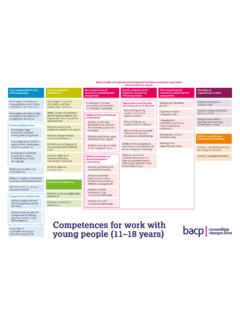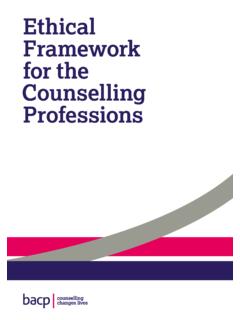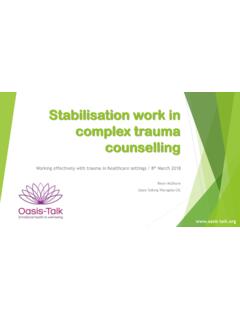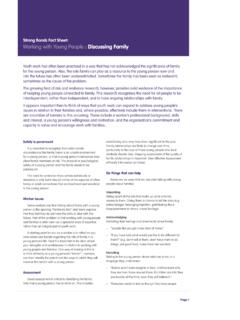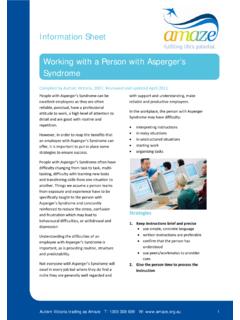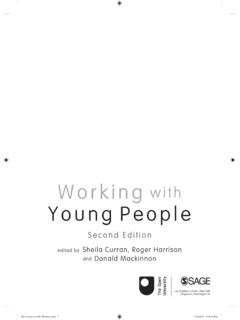Transcription of An evidenced informed curriculum framework for working ...
1 Counselling young people (11 18 years) Training CurriculumBACP Professional StandardsAn evidenced informed curriculum framework for working with young people (11 18 years)Counselling young people (11-18 years) Training curriculum This young people (11 18 years) training curriculum is published by the British Association for Counselling and Psychotherapy, BACP House, 15 St John s Business Park, Lutterworth, Leicestershire, LE17 : 01455 s primary purpose is to support counsellors and help them better serve their clients. Company limited by guarantee 2175320 in England and Wales, and a registered charity 2017 British Association for Counselling and Psychotherapy.
2 All rights is granted to reproduce for personal and educational use only. Commercial copying, hiring and lending are counselling young people (11 18 years) training curriculum Introduction 3 Rationale 4 Overall aim of the curriculum 4 curriculum structure 5 curriculum delivery 7A typical session 10 Assessment framework 11 Stage 1: Introduction to counselling young people 12 Introduction to counselling young people 13 Course entry requirements 14 Course content 14 Learning outcomes 15 Subject areas1 Ethical and professional practice (1) 162 Child protection and safeguarding (1) 173 Child and adolescent development and transitions (1) 184 Communication with young people (1) 195 Beginnings and endings with young people 206 Risk assessments (1) 217 Mental health and young people 228 working within the context of the counselling setting 23 Stage 2.
3 Formal award in counselling young people 24 Introduction 25 Course entry requirements 25 Course content 25 Placements and supervision 27 Subject areas9 Ethical and professional practice (2) 2810 Child protection & safeguarding (2) 3011 Child and adolescent development and transitions (2) 3212 The theory and principles of the counselling approach 35 Contents2 BACP counselling young people (11 18 years) training curriculum13 Therapeutic relationships with young people 3714 Communication with young people (2) 4015 working with young people s emotions 4216 Endings 4517 Risk assessments (2) 4718 Collaborative assessments 4919 Using measures and monitoring ou tcomes 5120 working with cultural diversity 5321 Mental health, pharmacology and young people 5522 Engagement with young people , parents and carers 5723 working within and across agencies 5924 working in a school setting 6125 working in a voluntary/community sector setting 6326 Holding the overall perspective 6527 Supervision 67 Stage 3.
4 Additional subject areas for advanced and top-up awards or post-qualifying CPD 69 Introduction 70 Subject areas28 working with groups 7129 Alternative models of intervention 7330 Emotional health promotion in schools 7431 Using self-help materials 7632 Applied relaxation 78 Reading list and resources 79 Essential reading 80 Supplementary reading materials 81 AppendixA Suggested post-stage 1 student feedback questionnaire 87B Suggested post-stage 2 student feedback questionnaire 88C young people s training curriculum : pathway options 89 Contents counselling young people (11 18 years) training curriculumIntroductionIntroduction4 IntroductionBACP counselling young people (11 18 years) training curriculumRationaleThis curriculum has been developed in a climate of rising concern for the mental health of young people .
5 It is, therefore, timely, since the demand for counsellors in schools, the NHS and other youth establishments is rising. This BACP Counselling young people (11 18 years) Training curriculum provides a consistent minimum standard to which counselling practitioners of young people aged 11 18 should be trained and provides a subject area guide for the full programme. The curriculum offers training providers a framework for a comprehensive course, reflecting the BACP Competences for Humanistic Counselling with young people (11 18 years), the writing of which was overseen by an Expert Reference Group (ERG) and developed using the Roth & Pilling (2008) methodology.
6 It is recommended that this curriculum be read in conjunction with these competences, which can be found at addition, courses and students are encouraged to make reference to BACP s Good Practice in Action Resources, in particular: 002 Legal Issues and Resources for Counselling young people in England, Northern Ireland and Wales in School Contexts; 003 Legal Resource: Counselling and Psychotherapy in the Context of Adoption Law in England, 005 Legal Resource: Counselling and Psychotherapy in the Context of Adoption Law in Northern Ireland and Wales; 011 Commonly Asked Questions: Monitoring the supervisory relationship from the perspective of a supervisee; 014 Legal Resource: Managing Confidentiality; 025 Legal Resource: Counselling and Psychotherapy in the Context of Adoption Law in Scotland; 026 Legal Resource: Counselling CYP in School Contexts in Scotland; 029 Legal Resource: Mental Health Law within the Counselling Professions in England and Wales; 031 Legal Resource: Safeguarding CYP in England, Wales and Northern Ireland.
7 038 Commonly asked questions about the Ethical framework for the Counselling Professions; 042 Fact Sheet: working with suicidal clients; 044 Fact Sheet: Ethical decision making in the context of the counselling professions; 046 Commonly Asked Questions: working with CYP; 052 Legal Resource: Understanding Child Protection in Scotland; 053 Legal Resource: Understanding the Children s Hearing System in Scotland; 057 Legal Resource: Suicide in the Context of the Counselling Professions in England and Wales: These resources are available to BACP members and can be found at is also recommended that this curriculum is used alongside the BACP Ethical framework for the Counselling Professions which can be found at aim of the curriculumThe aim of this curriculum is to enable counselling practitioners to gain knowledge of and competence in, working with young people aged 11 18 years in order to practice with this age group in an ethical and effective s Counselling young people (11 18 Years)
8 Training curriculum is aimed at training providers who wish to deliver counselling training for work with young people in a variety of different contexts. It is not the same as the CYP IAPT curriculum for Evidence Based Counselling Practice which is aimed at postgraduate level training within an IAPT context, although the two curricula are both underpinned by BACP s Competences for Humanistic Counselling with young people (11 18 years).5 BACP counselling young people (11 18 years) training curriculumIntroductionCurriculum structureThe training curriculum is divided into three parts:Stage 1: Introduction to Counselling young PeopleStage 2:Formal Award in Counselling young people ( Certificate or Diploma)Stage 3:Additional subject areas for advanced and top-up awards or for post-qualifying CPDThe curriculum is designed to be flexible to meet the varied needs of different training providers and the experience and/or previous training of practitioners.
9 Courses may wish to deliver Stage 1 in isolation, or Stages 1 and 2 together as part of the full award (see Appendix C: Pathway options). Some or all of the Subject areas included in Stage 3 can be included within training courses that are more advanced awards, or later for top-up awards. These subject areas can also be delivered separately as CPD training to support the ongoing development of post-qualified young people s counsellors. Core training for counselling children and young peopleThe training curricula for working with children (aged 4-10years) and for working with young adults (18-25years) are both in development.
10 Once this process is complete a core training curriculum for counselling children and young people (4-25years) will be developed. In the interim, training courses that wish to deliver a core practitioner training that specialises in counselling children and young people are encouraged to consider incorporating all of the elements in Stages 1, 2 and 3 of this curriculum into the course. In addition, to align with core training for working with adults and with BACP s requirements for registration and individual accreditation, such courses would need to be at least one year full-time or two years part-time and include at least 450 hours of tutor contact time.
